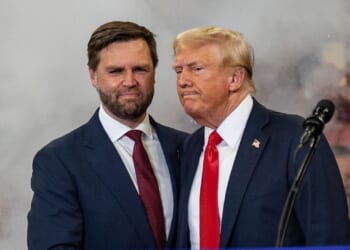Most of the media failed to report on a tremendously important development last week: King Abdullah of Jordan banned the Muslim Brotherhood in his country.
If Trump can bring [Saudi Arabia] into the Abraham Accords … he could achieve more stability in the Middle East than has existed for about a century.
We last heard of the Muslim Brotherhood (“the Brotherhood” or “al-Ikhwan”) six years ago when Egyptian President al-Sisi threw out his Brotherhood-backed predecessor, Mohamed Morsi, in a military coup. The history of al-Ikhwan is more interesting.
In March 1924, a Royal Air Force officer, John Bagot Glubb, rode a camel into Iraq from Syria. The mission of the tiny force he commanded was to protect the nomadic tribes of southern Iraq from raids by “al-Ikhwan” — the Brotherhood — that emanated from what was then called “the Nejed” and is now Saudi Arabia. (Glubb later commanded the army of Transjordan against the Israelis in the 1948 Israeli war of independence.)
Glubb, as he wrote in his 1960 book, “War in the Desert,” found that al-Ikhwan, a Wahhabist group, had no problem with killing Iraqi Muslims or any Christians or Jews that got in their way. Their murderous nature was quite ecumenical.
Flash forward about six decades to the modern version of the Muslim Brotherhood. As history tells us the Palestinian branch renamed itself Hamas. There are significant ties between the MB and Hizballah as well. It is not clear how they obtain funding or arms, but those commodities must be coming from Iran, which is one reason behind Abdullah’s action against them. Abdullah has also prohibited any Arab residents of the Gaza Strip emigrating to Jordan. He, like all the other Arab leaders, wants no part of the strife they would bring.
Jordan is one of the few Arab nations that is generally regarded as an ally of the West. Jordan signed a peace treaty with Israel in 1994. Abdullah, a former special forces helo driver, understands that Iran is the main danger.
There is a report that President Trump is enabling Saudi Arabia — perhaps as an incentive to join the “Abraham Accords” — to buy about $100 billion in U.S. arms. If Trump can get them to join the Abraham Accords — Trump’s greatest diplomatic achievement of his first term — it would, in effect, place Saudi Arabia with Israel and the U.S. in opposing both Iran and the Palestinians. The Saudis, of course, are terrified of Iran but they always play a double game.
In 2023 Crown Prince Mohammed bin Salman (“MBS”) reportedly told then U.S. Secretary of State Tony Blinken that he does not personally care about what he referred to as the “Palestinian issue,” only about the Saudi people.
Blinken, under orders from then-president Joe Biden, ignored the opening by the Saudis which could have resulted in their joining the Abraham Accords. Biden resented Trump’s accomplishment and failed to add any nation to the Accords.
Saudi Arabia is the most influential Arab state. If Trump can bring it into the Abraham Accords or into any agreement recognizing the legitimacy of Israel, he could achieve more stability in the Middle East than has existed for about a century.
On the other side of the coin, French President Emmanuel Macron said last week that France would likely recognize a Palestinian state in June. He didn’t define what land the so-called Palestinian state would consist of nor what its government would be.
Macron wants to curry favor with France’s enormous — and growing — Muslim population. But he has never come up with an answer to Charles de Gaulle’s 1958 question when de Gaulle asked, “How can you govern a country which has two hundred and forty-six varieties of cheese?”
Macron doesn’t understand that the idea of a “Palestinian state” died on October 7, 2023 when Hamas attacked Israel, killing over 1,200 people and taking at least 250 hostages of several nationalities including Americans.
If he goes ahead with his purported plan, Macron would further divide NATO and put France in opposition to both Trump and Israeli Prime Minister Netanyahu. He would make France a de facto ally of Iran. Macron, being French, is genetically incapable of being on the right side of history.
So where do we go from here?
Trump could put much more pressure on Macron with further tariffs on French goods, which would probably be counter-productive. France needs the U.S. market for its wine, cheese, and cars. If Trump threatened higher tariffs, Macron could conveniently forget his idea of recognizing a Palestinian state. It remains to be seen if he will.
Trump is now preoccupied with stopping Russia’s war on Ukraine in which he has met with no success. As I have written elsewhere, Trump has been treating Ukraine as if it were the enemy. It is not: Russia is. As Biden proved with his constant pressure on Israel to end the war there, pressuring our ally — even Ukraine — is not the way to end a war.
After meeting with Ukrainian President Zelensky at the pope’s funeral, Trump said that he has realized — finally — that Putin doesn’t want peace. He said, “It makes me think that maybe he doesn’t want to stop the war, he’s just tapping me along, and has to be dealt with differently, through ‘Banking’ or ‘Secondary Sanctions?’ Too many people are dying!!!”
That’s a reorientation of Trump’s thinking that should lead to a lot more pressure on Russia.
The president needs to refocus on the Israel-Hamas war and getting our remaining hostage — Eden Alexander — back to safety.
Jordan’s action in banning the Muslim Brotherhood should be endorsed by the president. The MB is a Pan-Islamic quasi-terrorist organization that still has influence in the Arab world. Getting Saudi Arabia to join the Abraham Accords — even by bribing it with arms sales — would be an enormous step in the right direction.
READ MORE from Jed Babbin:


![Vivek Gets Confronted by Protestor at GOP Event, Encounter Takes a Surprising Turn [WATCH]](https://www.right2024.com/wp-content/uploads/2025/04/Vivek-Gets-Confronted-by-Protestor-at-GOP-Event-Encounter-Takes-350x250.jpg)
![NYT Tries to Run Cover for Female Black Hawk Pilot... DEI-Driven Military Failures? [WATCH]](https://www.right2024.com/wp-content/uploads/2025/04/NYT-Tries-to-Run-Cover-for-Female-Black-Hawk-Pilot-350x250.jpg)



![Reality Hits Adam Schiff in San Francisco—It’s Not Pretty for Democrats [WATCH]](https://www.right2024.com/wp-content/uploads/2025/04/Reality-Hits-Adam-Schiff-in-San-Francisco—Its-Not-Pretty-for-350x250.jpg)
![James Comer Hints at the Epic Behind-the-Scenes Effort Targeting the Deep State [WATCH]](https://www.right2024.com/wp-content/uploads/2025/04/James-Comer-Hints-at-the-Epic-Behind-the-Scenes-Effort-Targeting-the-350x250.jpg)






